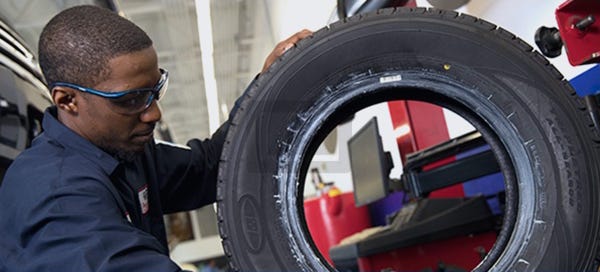Raise Your Ride: Trust Fund Morris Tires for GMC Tires Service
Tire Solution: The Impact of Climate Conditions
When it involves ensuring optimum performance and safety when driving, understanding the effect of weather condition conditions on tire solution is essential. From scorching warmth to icy roads, each climate element can considerably affect tire capability and general driving experience. By diving right into the results of differing climate condition on tires, chauffeurs can acquire beneficial insights that may improve their car's efficiency and long life. In this conversation, we will certainly discover the intricate connection between climate condition and tire service, clarifying the importance of weather-specific tire maintenance practices and factors to consider.
Heat and Tire Performance
When subjected to high temperature levels, tires experience adjustments in performance that can dramatically influence vehicle safety and security and handling. The warmth produced from extended driving or heat problems triggers the tire rubber to soften, leading to reduced tread life and increased wear. As the rubber comes to be softer, the tire's grip when driving reduces, impacting braking ranges and overall grip. In severe situations, excessive heat can even trigger tire blowouts, posing an extreme security risk to the vehicle and its occupants.

Cold Climate Impacts
Cold weather condition problems can have a significant impact on tire efficiency and security. In cold weather, tires may likewise lose air pressure a lot more swiftly, which can affect managing and fuel performance.
To alleviate the effects of winter on tires, it is critical to consistently examine tire pressure and inflate them to the producer's suggested degrees. Utilizing winter season or all-season tires designed for winter conditions can likewise boost traction and grip on icy or snowy roads. Correct tire maintenance, consisting of regular assessments for wear and damage, ends up being a lot more important during cooler months to guarantee optimum efficiency and safety and security.
Rainy Conditions Influence
During rainy problems, tire performance and safety and security can be substantially influenced by the wet road surfaces and reduced visibility. The walk pattern of tires plays a crucial role in maintaining grip on wet roads. Tires with worn-out footsteps are extra prone to hydroplaning, where a layer of water develops between the road and the tire surface area, causing loss of grip. To fight this, motorists ought to consistently evaluate their tires for ample tread depth and take into consideration investing in tires especially created for damp problems.
Additionally, rainy weather condition can additionally decrease exposure, making it challenging for motorists to see the road ahead plainly (GMC Tire Service). In such conditions, it is important to adjust driving speeds appropriately and keep a secure complying with distance to enable for sudden stops. Correctly inflated tires can likewise assist in keeping control on wet roads by supplying far better handling and grasp
Snow and Tire Safety And Security
Snow-covered roadways position one-of-a-kind difficulties for chauffeurs, stressing the value of appropriate tire option and upkeep. When driving in snowy problems, having the appropriate tires can make a significant distinction in safety and security and performance. Wintertime tires are made with unique rubber substances and step patterns to give better grip on snow and ice contrasted to all-season tires. The deeper footsteps and sipes of winter season tires aid grasp the Website roadway better, decreasing the danger of slipping and sliding.

It is vital to comply with manufacturer guidelines when mounting and utilizing tire chains to prevent damages to the tires and lorry. By selecting the ideal tires, preserving correct inflation, and thinking about added grip aids like tire chains, motorists can boost their safety and security when browsing snow-covered roadways.
Weather-Related Tire Upkeep
When encountered with different weather conditions, appropriate tire upkeep ends up being a critical aspect of automobile safety and security and performance. Weather-related tire maintenance includes a variety of practices focused on making sure ideal tire feature and longevity in different weather situations. One essential aspect of weather-related tire maintenance is tire stress law. Changing temperatures can create tire stress to vary, impacting grip and fuel performance. Consistently readjusting and inspecting tire pressure according to supplier referrals is vital for safe driving in altering weather problems. Additionally, tire step depth plays a substantial duty in dealing with various weather condition aspects. Tires with ample step depth give far better grip on damp or icy roads, decreasing the risk of skidding or hydroplaning. When tread wear reaches a certain depth is crucial for keeping grip and stability in unfavorable weather, inspecting tire step on a regular basis and replacing tires. By prioritizing weather-related tire upkeep, vehicle drivers can improve safety and security, boost vehicle performance, and lengthen the lifespan of their tires.
Conclusion
To more tips here conclude, climate condition have a considerable influence on tire performance and security. From warm affecting tire stress and use to winter decreasing traction, it is necessary to think about the climate when maintaining and making use of tires. Stormy conditions can lower grip and result in hydroplaning, while snow can increase the danger of crashes if tires are not effectively equipped. Weather-related tire upkeep is essential in making sure ideal efficiency and safety and security when driving.
In this discussion, we will check out from this source the detailed connection between weather condition problems and tire service, shedding light on the significance of weather-specific tire upkeep techniques and factors to consider.
